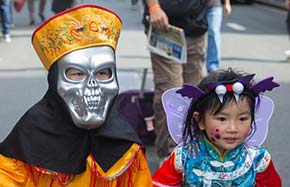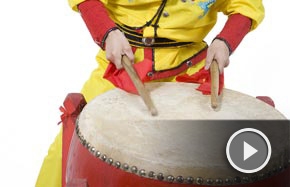Program brings Sinologists closer to China
A program for young Sinologists is helping academics from all over the world gain a deeper understanding of the country. Xu Lin reports.
At a workshop in Jingdezhen, Jiangxi province, Polina Tsoncheva is carefully pinching clay on a spinning potter's wheel, molding it into a plate.
"It's such an indelible memory! The city is world-famous for its pottery and ceramics, and I get to see the process of how Chinese craftsmen make them," says the assistant professor who teaches Chinese and translation at St. Cyril and St. Methodius University of Veliko Tarnovo, in Bulgaria.
Tsoncheva was on a four-day field trip to Jiangxi's Jingdezhen, Wuyuan and Sanqing Mountain as part of a cultural experience. They visited old villages, ancient porcelain kiln sites and watched traditional operas.
It was part of the recent three-week 2017 Visiting Program for Young Sinologists in Beijing, in which 27 Sinologists from 26 countries participated. With an average age of 36, their research fields include the Chinese language, history and politics.
The Ministry of Culture and the Chinese Academy of Social Sciences co-founded the annual project in Beijing in 2014. This year, it was held in four cities-Beijing, Shanghai, Xi'an and Zhengzhou-with a total of 120 participants.
"Young Sinologists can not only enhance their academic level, but also explore Chinese culture and society," says Zhu Qi, deputy director of the international liaison department of the Ministry of Culture.
"It was the most wonderful three weeks, at least in my last 10 years," says Tsoncheva. "After listening to the lectures given by Chinese scholars in Beijing, interesting ideas for my future research have come to my mind."
She wants to delve into the history of Tongwen Guan, or the School of Combined Learning. Founded in the late Qing Dynasty (1644-1911), the government school taught foreign languages and scientific subjects. In 1902, it was merged with the Imperial University of Peking, which is now Peking University.
"The school was established due to the demands of translators and interpreters. Studying foreign languages allows one to meet different people and learn about the culture, history and traditions of other countries," she says.
She also wants to further her study tracing the earliest time when Chinese literature entered Bulgaria and how it influenced Bulgarian literature. She discovered that in the 19th century, poems by Tang Dynasty (618-907) poets, such as Li Bai and Du Fu, were translated into Bulgarian from Russian or German versions.
"They didn't know Chinese, but their translations capture the Chinese spirit," she says.























